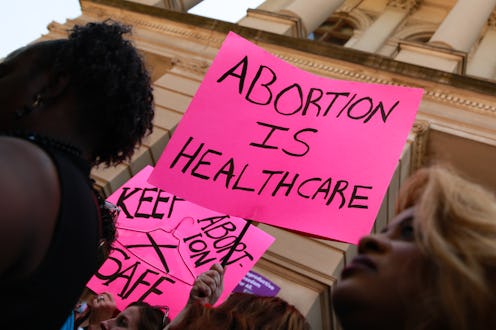
Back in May, Georgia Gov. Brian Kemp signed one of the most restrictive bans in the country, which would outlaw abortion as early as six weeks into pregnancy. Now, the Georgia abortion ban is being challenged in court by multiple reproductive rights organizations, to stop it before it takes effect next January.
The American Civil Liberties Union, Planned Parenthood, and the Center for Reproductive Rights sued Georgia officials on Friday and are calling on a judge to block the ban from being implemented. They have filed this lawsuit on behalf of SisterSong Women of Color Reproductive Justice Collective and several of its member providers, CNN reported. Bustle has reached out to SisterSong for comment.
In the lawsuit, the organizations wrote that this six-week abortion ban "will prevent Georgians from exercising their fundamental constitutional right to decide whether to have an abortion prior to viability and will threaten other critical medical care for pregnant women, causing irreparable harm," per KTVZ. The lawsuit mentions Kemp by name, but the Georgia governor said when he signed off on the bill in May that he expected to face some sort of legal challenge and that he would nonetheless continue to defend the ban.
This challenge to Georgia's ban comes on the heels of another legal battle over abortion. On Wednesday, the ACLU and Planned Parenthood filed a lawsuit against Arkansas state officials in order to block the state's 18-week abortion ban from going into effect this summer. According to CNN, reproductive rights organizations are also challenging other Arkansas laws that would impose additional restrictions on who can perform abortions and who can receive them.
In a statement to CNN, Center for Reproductive Rights CEO Nancy Northup noted that more and more states have been trying to pass restrictions on abortion in recent years.
"Georgia is one of nine states that have passed abortion bans this year in the hopes of overturning Roe v. Wade," Northup said. "None of these laws are in effect, and we are fighting to keep it that way. For nearly half a century, the Supreme Court has protected the right to abortion, and we know the majority of Americans continue to support abortion access."
Abortion bans like the one in Georgia disproportionately impact "low-income Georgians, Georgians of color, and rural Georgians, who are least able to access medical care and least able to overcome the cruelties of this law," according to Friday's lawsuit. The reproductive rights organizations behind the lawsuit have also argued that "fetal heartbeat" legislation "practically bans all abortions" because many people don't know they're pregnant at six weeks.
Reproductive rights activists have long made the argument that people will have abortions whether or not they are legal, The Guardian reported, but if abortions are inaccessible by law, then pregnant people are more likely to seek out unsafe avenues to obtain an abortion. That's why the ACLU, Planned Parenthood, and the Center for Reproductive Rights are taking states like Georgia and Arkansas to court; for now, abortion is still legal in these states, and reproductive rights advocates hope to keep it that way.